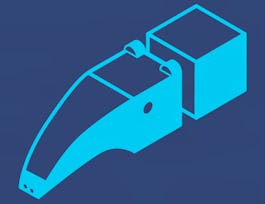The Advanced Blockchain Architectures course is ideal for individuals with a basic understanding of digital technology as well as developers or security professionals wishing to expand their blockchain knowledge. It provides an in-depth exploration of Blockchain architecture, emphasizing technical components and complex features like cryptography and node management. Students will gain a comprehensive understanding of crucial aspects such as the integral parts of Blockchain, proof of concept for a private blockchain, privacy issues, and security measures. The course also delves into the interoperability between different blockchains, the scalability of blockchain solutions, and the environmental impacts of blockchain technology.



Advanced Blockchain Architectures
This course is part of Blockchain Solution Architecture Specialization

Instructor: Kris Bennett
Sponsored by Mojatu Foundation
Recommended experience
Details to know

Add to your LinkedIn profile
17 assignments
See how employees at top companies are mastering in-demand skills

Build your subject-matter expertise
- Learn new concepts from industry experts
- Gain a foundational understanding of a subject or tool
- Develop job-relevant skills with hands-on projects
- Earn a shareable career certificate


Earn a career certificate
Add this credential to your LinkedIn profile, resume, or CV
Share it on social media and in your performance review

There are 8 modules in this course
This course provides an in-depth exploration of Blockchain architecture, emphasizing technical components and complex features like cryptography and node management. You will gain a comprehensive understanding of crucial aspects such as the integral parts of blockchain, proof of concept for a private blockchain, privacy issues, and security measures. We will also explore the inoperability between different blockchains, the scalability of blockchain solutions, and the environmental impacts of blockchain technology.
What's included
1 video4 readings
This module provides an overview of the end-to-end process of delivering a blockchain solution. It starts with techniques for conducting a needs analysis and identifying appropriate use cases for blockchain technology. Students learn how to design and implement a proof of concept, including network topology, consensus mechanisms, and smart contract programming. The module covers best practices for transitioning a successful proof of concept into a minimum viable product suitable for live deployment. Students gain hands-on experience taking a blockchain solution from conception through production rollout.
What's included
11 videos3 readings4 assignments1 discussion prompt2 plugins
This module analyzes the distinct landscapes of blockchain adoption for consumers versus enterprises. It uses the "blockchain iceberg" analogy to illustrate the high visibility of consumer-facing applications compared to enterprise blockchain projects. The module outlines key enterprise use cases in finance, supply chain, credentialing etc. It also covers limitations and concerns for enterprise blockchain adoption including integration, security, governance and more. Students will be able to articulate strategic considerations for blockchain adoption tailored to consumer vs enterprise contexts.
What's included
8 videos3 readings2 assignments2 discussion prompts
Introduces the concept of self-sovereign identity and its importance for security, privacy and interoperability of blockchain solutions. It explains how blockchain approaches like decentralized identifiers and verifiable credentials can empower users to own and control their digital identities without centralized authorities. Students will grasp technical implementations of self-sovereign identity on blockchains and why it represents a paradigm shift for identity management on the internet.
What's included
6 videos3 readings2 assignments1 discussion prompt
Contextualizes blockchain technology in the evolution from Web 2.0 to Web 3.0. It provides students with a nuanced perspective on the gradual transition taking place rather than a disruptive shift to a wholly new paradigm. The module outlines the key technical and cultural elements of Web 2.0 and Web 3.0 models. It discusses how integrating aspects of both models serves as a bridge to the future capabilities of Web 3.0.
What's included
6 videos3 readings1 assignment1 discussion prompt1 plugin
Provides students with an in-depth understanding of techniques for integrating blockchain networks with other blockchains as well as legacy centralized systems. It covers atomic swaps, hash time locked contracts, sidechains/relays, and decentralized oracles. Students will be able to architect interoperable blockchain ecosystems.
What's included
5 videos3 readings1 assignment2 discussion prompts
Analyzes key sustainability considerations pertaining to blockchain technology. It examines the carbon footprint of mining and consensus protocols along with eWaste from hardware turnover. Other topics include geopolitical issues around cryptocurrencies, quantum computing risks, and the long-term viability of cryptoassets. Students will develop a nuanced perspective on blockchain sustainability.
What's included
15 videos3 readings5 assignments2 discussion prompts2 plugins
This module equips students with resources for launching their blockchain journeys. It provides guidance on certification programs, in-demand skills, and the blockchain job market. Students will identify their goals and chart a path forward with the knowledge, tools and recommendations provided.
What's included
3 videos1 reading2 assignments
Instructor

Offered by
Why people choose Coursera for their career




Recommended if you're interested in Computer Science

Board Infinity

University of California, Irvine

Open new doors with Coursera Plus
Unlimited access to 10,000+ world-class courses, hands-on projects, and job-ready certificate programs - all included in your subscription
Advance your career with an online degree
Earn a degree from world-class universities - 100% online
Join over 3,400 global companies that choose Coursera for Business
Upskill your employees to excel in the digital economy




